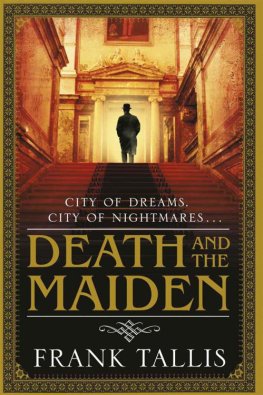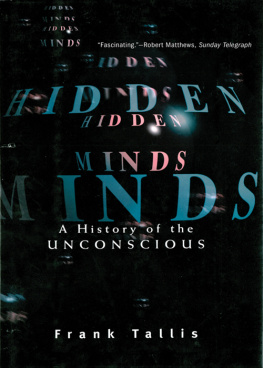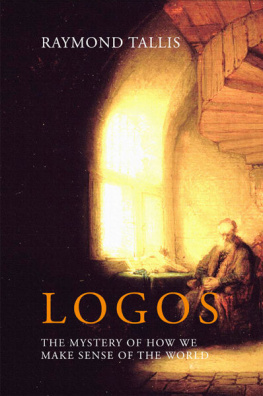Frank Tallis - Fatal Lies
Here you can read online Frank Tallis - Fatal Lies full text of the book (entire story) in english for free. Download pdf and epub, get meaning, cover and reviews about this ebook. genre: Detective and thriller. Description of the work, (preface) as well as reviews are available. Best literature library LitArk.com created for fans of good reading and offers a wide selection of genres:
Romance novel
Science fiction
Adventure
Detective
Science
History
Home and family
Prose
Art
Politics
Computer
Non-fiction
Religion
Business
Children
Humor
Choose a favorite category and find really read worthwhile books. Enjoy immersion in the world of imagination, feel the emotions of the characters or learn something new for yourself, make an fascinating discovery.
- Book:Fatal Lies
- Author:
- Genre:
- Rating:3 / 5
- Favourites:Add to favourites
- Your mark:
- 60
- 1
- 2
- 3
- 4
- 5
Fatal Lies: summary, description and annotation
We offer to read an annotation, description, summary or preface (depends on what the author of the book "Fatal Lies" wrote himself). If you haven't found the necessary information about the book — write in the comments, we will try to find it.
Fatal Lies — read online for free the complete book (whole text) full work
Below is the text of the book, divided by pages. System saving the place of the last page read, allows you to conveniently read the book "Fatal Lies" online for free, without having to search again every time where you left off. Put a bookmark, and you can go to the page where you finished reading at any time.
Font size:
Interval:
Bookmark:
Frank Tallis
Fatal Lies
1
The baroque ballroom was filled with flowers. Beneath three radiant chandeliers more than a hundred couples were rotating in near-perfect synchrony. The men were dressed in black tails, pique shirts, and white gloves, the women in gowns of tulle and crepe de chine. On a raised platform a small orchestra was playing Strauss's Rosen aus iem Suien, and when the waltz king's famous heartwarming melody was reprised, a number of onlookers began a sympathetic humming chorus-smiling with recognition and benign sentimentality.
Liebermann felt Amelia Lyd gate s right hand tighten with anxiety in his left. A vertical line appeared on her forehead as she struggled to follow his lead.
I do apologize, Dr. Liebermann. I am such a poor dancer.
She was wearing a skirted decollete gown of green velvet, and her flaming red hair was tied up in silver ribbons. The pale unblemished planes of her shoulders reminded the young doctor of polished Italian marble.
Not at all, said Liebermann. You are doing very well for a novice. Might I suggest, however, that you listen more carefully to the music. The beat.
The Englishwoman returned a puzzled expression. The beat, she repeated.
Yes, can you not-Liebermann paused, and made an effort to conceal his disbelief- feel it?
Liebermann s right hand pressed gently against Amelia's back, emphasizing the first accented beat in each bar. However, his guidance had no noticeable effect on her performance.
Very well, then, said Liebermann. Perhaps you will find the following useful: the natural turn consists of three steps in which you move forward and rotate clockwise by one hundred and eighty degrees, followed by three steps in which you move backward and rotate again by one hundred and eighty degrees. For the forward turn you move forward on your right foot, rotating it to the right by ninety degrees, followed by your left foot, rotated another ninety degrees so that it is now facing backward
Amelia stopped, tilted her head to one side, and considered these instructions. Then, looking directly into Liebermann s eyes, she said plainly: Thank you, Dr. Liebermann, that is an altogether superior explanation. Let us proceed.
Remarkably, when they began to dance again, Amelia s movements were considerably more fluid.
Excellent, said Liebermann. Now, if you lean back a little, we will be able to go faster. Amelia did as she was instructed, and they began to revolve more rapidly. I believe, continued Liebermann, that the optimal speed of the Viennese waltz is said to be approximately thirty revolutions per minute. He saw Amelia glance at his exposed wristwatch. However, I do not think it will be necessary for us to gauge our performance against this nominal ideal.
As they swung by the orchestra, they were overtaken by a portly couple who-in spite of their ample physiques-danced with a nimbleness and grace that seemed to defy gravity.
Good heavens, said Amelia, unable to conceal her amazement. Is that Inspector Rheinhardt?
It is, said Liebermann, raising an eyebrow.
He and his wife are very accomplished.
They are indeed, said Liebermann. However, it is my understanding that Inspector Rheinhardt and his wife are more practiced than most. During Fasching not only do they attend this the detectives ball-but they are also regular patrons of the waiters ball, the hatmakers ball, the philharmonic ball, and, as one would expect-Liebermann smiled mischievously-the good inspector has a particular fondness for the pastry makers ball.
As they wheeled past a pair of carved gilt double doors, Liebermann saw a police constable enter the ballroom. His plain blue uniform and spiked helmet made him conspicuous among the elegant tailcoats and gowns. His cheeks were flushed and he looked as though he had been running. The young man marched directly over to Commissioner Brugel, who was standing next to the impeccably dressed Inspector Victor von Bulow and a party of guests from the Hungarian security office.
Earlier in the evening, Liebermann had tried to engage the Hungarians in some polite conversation but had found them rather laconic. He had ascribed their reserve to Magyar melancholy, a medical peculiarity with which he, and most of his colleagues in Vienna, were well acquainted.
Liebermann lost sight of the group as Amelia and he continued their circumnavigation of the ballroom. When they had completed another circuit, he was surprised to see Else Rheinhardt standing on her own and looking toward her husband-who was now talking to Commissioner Brugel and the breathless young constable. Liebermann's observation coincided with the brassy fanfares that brought the waltz to its clamorous conclusion. The revelers cheered and applauded the orchestra. Liebermann bowed, pressed Amelia's fingers to his lips, and, taking her hand, led her toward Else Rheinhardt.
I think something's happened, said Else.
Manfred Brugel was a stocky man with a large, blockish head and oversize muttonchop whiskers. He was addressing Rheinhardt, while occasionally questioning the young constable. Rheinhardt was listening intently. In due course, Rheinhardt clicked his heels and turned to find his wife and friends.
My dear, said Rheinhardt, affectionately squeezing Else's arm, I am so very sorry but there has been an incident. He glanced briefly at Liebermann, tacitly communicating that the matter was serious. I am afraid I must leave at once.
Isn't there anyone on duty at Schottenring? asked Else.
Koltschinsky has developed a bronchial illness, and Storfer-on being informed of the said incident-rushed from the station, slipped on some ice, and cracked his head on the pavement.
What extraordinary bad luck, said Liebermann.
Why is it always you? said Else. Can't somebody else go? What about von Bulow?
I believe he has some important business to discuss with our Hungarian friends. The air suddenly filled with the shimmering of tremolando violins, against which two French horns climbed a simple major triad. Nothing in the whole of music was so artless, yet so distinctive. Ah, said Rheinhardt, what a shame The Blue Danube. He looked at his wife and his eyes filled with regret.
Oskar, said Liebermann. Can I be of any assistance? Would you like me to come with you?
Rheinhardt shook his head.
I would much rather you kept my dear wife and Miss Lyd gate entertained. Now, where's Haussmann? The Inspector looked around the ballroom and discovered his assistant standing with a group of cavalrymen, gazing wistfully at a pretty young debutante in white. Heavy blond coils bounced against her cheeks. Haussmann, having clearly been engaged in a protracted surveillance operation, was about to reveal himself. He was clutching a single red rose. Oh, no, said Rheinhardt under his breath.
The inspector kissed his wife, apologized to Amelia, and clasped Liebermann's hand. Then, moving quickly, he managed to intercept the rose just before Haussmann had reached his quarry.
2
The innkeeper at Aufkirchen had been pleasant enough. Knocking a dottle of tobacco from the bowl of his clay pipe, he had warned Rheinhardt of a fallen tree: It's blocking the road-you'll have to go the long way around. The directions the man had given were full of local detail and were difficult to follow. When the little Romanesque church with its distinctive onion dome and spire vanished in the darkness, Rheinhardt doubted whether the exercise had been very successful.
The interior of the carriage was illuminated by a single electric bulb, the glowing arc of which was reflected in Haussmann's eyes. Rheinhardt fancied that this flickering scintilla of light was connected with the young man's thoughts-the fading memory, perhaps, of the pretty blond debutante.
Their ascent was becoming extremely uncomfortable. The narrow track that they had chosen was riddled with potholes, causing the carriage to pitch and roll. Rheinhardt pulled the curtain aside and pressed his face against the glass. He could see nothing. Releasing the catch, he opened the window and leaned out. The air was cold and dank. Ahead, the carriage lamps shone against descending blankets of thick fog.
Font size:
Interval:
Bookmark:
Similar books «Fatal Lies»
Look at similar books to Fatal Lies. We have selected literature similar in name and meaning in the hope of providing readers with more options to find new, interesting, not yet read works.
Discussion, reviews of the book Fatal Lies and just readers' own opinions. Leave your comments, write what you think about the work, its meaning or the main characters. Specify what exactly you liked and what you didn't like, and why you think so.








